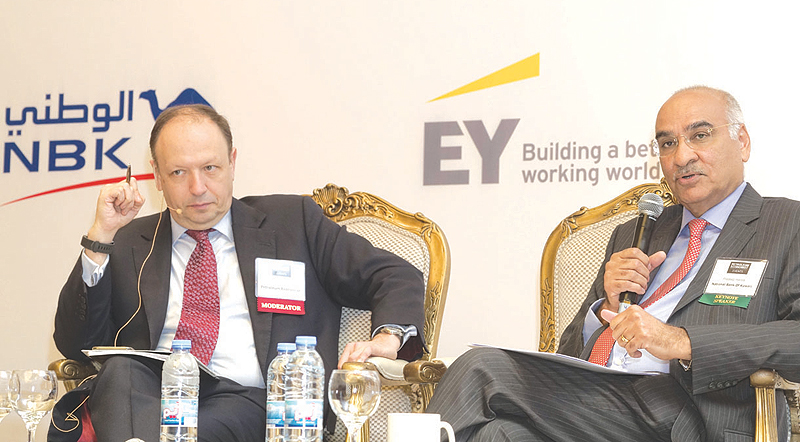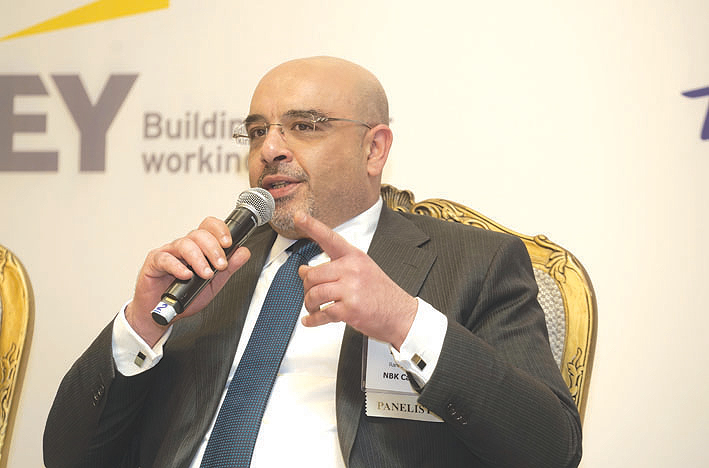NBK led financing of energy projects worth KD 3bn over the last couple of years
KUWAIT: During his participation at the Fifth GCC Energy Strategy Forum held in Kuwait, the General Manager of Foreign Corporate, Oil and Trade Finance Group of the National Bank of Kuwait, Pradeep Handa, said that bank lending remains the leading financing tool for large projects in the countries of the Gulf Cooperation Council (GCC).

He said: "The region's banks have more liquidity and the debt capital market for the energy sector, and energy companies in specific, provides inherent advantages that include fixed interest rates, flexibility in financings and a wider lending base."
Handa gave an overview on the energy sector in Kuwait, starting with a look at KPC's 2040 vision and the increases projected in output, while the broader energy sector, Public-Private Partnership projects are planned to be tendered at a minimum CAPEX of $5 billion on the short-term. CAPEX is expected to see an additional $394 billion until 2040.

He added: "The lending environment may change in the future as borrowers become more sophisticated, GCC markets become more mature and regulatory capital gets more scarce for regional banks. Initiatives in these direction are seen with an increasing emphasis on the PPP model in Saudi, UAE, Oman, Bahrain and Qatar, however much less in Kuwait despite the opportunities."
Handa however spoke of the success of major financings taking place in Kuwait and the region, as well as the success of sukuks and bonds for the private sector.
He said: "The opportunities available for financing these projects in the backdrop of relatively low oil prices and budget deficits projected are abundant. "NBK has led the financing of over KD 1.2 billion for the Clean Fuels Project and KD 390 million for the LNG Terminal. We've recently completed the financing of the Duqm Refinery Project at $4.6 billion, which is one third financed by a mix of Kuwaiti banks. The Bank has also successful managed the Sukuks and Bonds issuance a leading petrochemical company, EQUATE. Banks without a doubt remain a great supporter to the energy sector, and the opportunities are ahead of us."
Meanwhile, Managing Director and Head of Investment Banking at NBK Capital, Rani Selwanes, participated as a panelist to discuss: New Methods for Financing Energy Projects and Investment Opportunities.
In his remarks, Selwanes focused on the growth prospects and capital expenditure for Kuwait's oil sector. He presented insight into the various financing tools available for the oil sector. Furthermore, he added that the K-companies will be able to adopt structured financing structures to secure long-term financing including direct bank loans and global market fixed income issuances. Selwanes highlighted the key challenges borrowers, including Kuwait Petroleum Corporation and its subsidiaries, have to consider while obtaining financing, including; the extensive timelines associated with formal approvals, regulatory restrictions on the local banking sector, and international investor stringent requirements including collaterals disclosures and corporate governance.
The Arab Petroleum Investments Corporation ("APICORP") estimates that GCC member states will require around $320 billion in expected capital expenditure for oil and gas projects over the next five years, while the Middle East and North Africa region is expected to invest around US$611 billion in the energy sector over the same period.
Selwanes emphasized on the local banking market's ability and readiness to support and finance the Kuwait's oil sector upcoming mega projects. "The Kuwaiti banking sector has significant capacity and ample appetite to finance the oil sector's projects," Selwanes said. "There are several advantages to obtain financing through the local banks as opposed to International financing, including the attractive interest rate environment in addition to the Kuwaiti banks' ability to provide dollar financing, which what the market witnessed during the dollar financing of the Duqum refinery in Oman."




